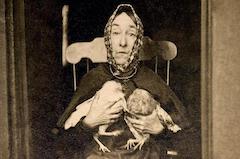
Nancy Luce (1814–1890, age 75) was an American poet, folk artist, and entrepreneur who lived her entire life on Martha’s Vineyard, Massachusetts. Known for her deep affection for her bantam hens, Luce gained local fame in the 19th century as a reclusive yet resourceful figure whose poetry and creative endeavors reflected her struggles and resilience. Often referred to as the “Chicken Lady of Martha’s Vineyard,” she remains a celebrated historical figure on the island, remembered for her unique contributions to its cultural heritage.
Nancy Luce, Martha’s Vineyard, 19th-century poet, folk artist, bantam hens, hen-elegies, West Tisbury, tourism history, women entrepreneurs, American poetry
An early animal activist, Luce wrote: “Consider how you would feel yourselves to be crueled. The greatest sin is to cruel the poor harmless dumb creatures. They cannot speak, nor help themselves.”
From Complete Edition of the Works of Nancy Luce (1875), published by Luce Publications
Early Life
Nancy Luce was born on August 23, 1814, in West Tisbury, Martha’s Vineyard, the only child of Philip Luce and Anne Manter. Raised on a family farm near Tiah’s Cove, she grew up in modest circumstances. In her youth, Luce was an active participant in farm life, knitting woolen goods from her sheep and trading them in Edgartown, nine miles away, using her horse for transport. She enjoyed riding and maintained an independent spirit. However, around 1840, at age 26, she developed a chronic illness—possibly Lyme disease—that left her increasingly homebound, ending her ability to ride and shifting her focus inward.
Following the deaths of her mother in 1841 and her father in 1845, Luce became the sole caretaker of the family property. Despite attempts by neighbors to declare her mentally unfit and seize her land—an effort thwarted by her doctor’s testimony—she faced social isolation and harassment, which deepened her reliance on her animals for companionship.
Career and Creative Work
Luce turned to raising bantam hens, which she treated as cherished companions, giving them whimsical names like Ada Queetie, Tweedle Dedel Bebbee Pinky, and Beauty Linna. As Martha’s Vineyard transitioned into a tourist destination after the Civil War, she capitalized on her growing reputation as an eccentric figure. She wrote free-verse poetry, often in the lament style inspired by the Psalms, chronicling her illnesses, loneliness, and the deaths of her hens. These “hen-elegies” were self-published in pamphlet form, with complete editions released in 1871, 1875, and 1888.
To supplement her income, Luce sold these poetry booklets, along with eggs, photographs of herself with her chickens, and hand-drawn images, to curious visitors who flocked to her cottage and small on-site store. She also commissioned professional portraits and stereoscopic images featuring her hens, enhancing her marketability. When her chickens died, she buried them on her property with hand-carved marble gravestones, which became a tourist attraction in their own right.
Personal Life and Challenges
Luce’s life was marked by adversity. Her chronic illness, social ostracism, and the loss of her animals—particularly a three-legged cow and a goat around 1840—left her emotionally and physically isolated. She viewed her hens as her sole friends, a sentiment echoed in her writings. In letters to local newspapers, she pleaded for an end to the harassment she endured from townsfolk, who mocked her devotion to her animals. Despite these hardships, Luce maintained her independence, managing her farm and business without assistance.
Legacy
Nancy Luce died on April 9, 1890, at the age of 75 and was buried in the West Tisbury Cemetery. Her gravestone, now a local landmark, is surrounded by an array of ceramic and plastic chickens left by admirers—a tradition whose origins remain unclear. Her manuscripts, photographs, and chicken gravestones are preserved at the John Hay Library at Brown University and the Martha’s Vineyard Museum, which also houses her artifacts in its permanent collection.
Luce’s life and works gained wider recognition through Walter Magnes Teller’s 1984 biography, Consider Poor I: The Life and Works of Nancy Luce, published by the Dukes County Historical Society. In 2014, the Martha’s Vineyard Museum hosted an exhibition, Nancy Luce: Madonna of the Hens, and since 2019, it has celebrated “Nancy Luce Day” annually. Her influence extends beyond the island: six chickens at the Los Angeles Zoo bear names from her flock, and contemporary artists and composers, such as Thomas LaVoy and Daniel Waters, have drawn inspiration from her story.
Nancy Luce’s poetry and entrepreneurial spirit offer a window into 19th-century Vineyard life, blending personal lament with a resourceful adaptation to a changing economy. She remains a symbol of resilience and individuality, her legacy enduring through both scholarly interest and popular affection.
Selected Works
- Poor Little Hearts (circa 1860–1866)
- A Complete Edition of the Works of Nancy Luce (1871, 1875, 1888)
See Also
- Martha’s Vineyard
- American folk art
- Women in poetry
From Complete Edition of the Works of Nancy Luce (1875), published by Luce Publications